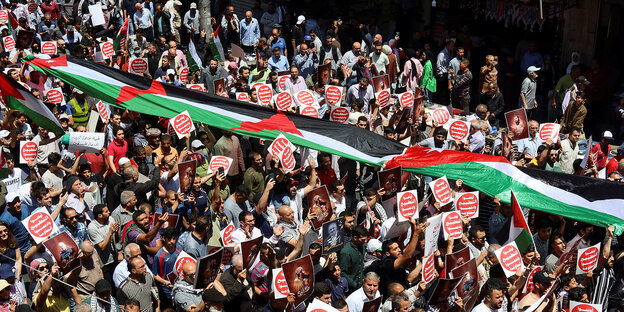Jordan has arrested hundreds of people in connection with Palestinian protests. Other Arab countries are also cracking down on protests.

After the pro-Palestinian protests in Amman, hundreds of people ended up in prison within days Photo: Jehad Shelbak/Reuters
AMMAN taz | It was the tweets about the pro-Palestinian protests that put President al-Jabri behind bars. A criticism of the actions of the police, who fired tear gas against the protesters, he says. The Jordanian justice system apparently considered him a threat to social peace and an insult to institutions.
Al-Jabri is a Jordanian journalist who works for the Turkish news website. Arabic mail. The scene of the controversy is the Jordanian capital, Amman, where people have taken to the streets every week since the beginning of the Gaza war. They protest against the war, against Israel and all those who support it.
The situation worsened at the end of March. Groups of protesters marched towards the heavily guarded Israeli embassy, and police used tear gas and batons. Hundreds of people were arrested in just a few days.
When al-Jabri returned home from the protest and posted his tweets, he had no idea. It wasn't until two days later that the police summoned him to the police station. He was arrested and questioned by the cybercrime unit, he tells Taz. He was then taken to the prosecutor's office and charged under a controversial new cybercrime law. He remained in an overcrowded cell at Marka prison for five days before being released on bail on March 30.
The 34-year-old man is currently awaiting trial. Short messages are no longer online, but demand remains. “The prison conditions were inhumane; I was locked up with criminals, murderers and thieves,” he recalls. “But we are not criminals or traitors to our countries of origin.”
Abuse of power through administrative detention
Al-Jabri is one of approximately 1,500 people arrested in Jordan in connection with protests since October, according to Amnesty International. It is said that 500 have ended up in prison since March alone. Several have been released, others remain in custody.
Like Atija Abu Salem, a Syrian refugee and media student who, according to his lawyer, was traveling on April 9 to film a pro-Palestinian protest near the Israeli embassy. Security forces arrested him and his fellow student. Now they threaten to deport him to Syria. His lawyer emphasizes that no official charges have yet been filed.
A request to the Jordanian authorities went unanswered, but Amnesty International confirmed the two cases in recent reports. In late March, Jordanian police wrote in a public statement that security forces had shown “utmost restraint” during the protests but had been forced to arrest people for attacks and rights violations of various kinds. He also posted videos of garbage burning in the alleys of the Baqa'a Palestinian refugee camp in northern Amman.
But human rights associations are sounding the alarm. “What we are seeing and what concerns us is the use of a notoriously repressive cybercrime law to convict people for exercising their right to freedom of expression,” said Hiba Zayadin, a researcher at Human Rights Watch, “as well as the abuse of power of governors and other officials who take advantage of administrative detention.”
Zayadin alludes to cases in which detainees were released by judges or prosecutors, only to be detained again a short time later by order of the governor.
Amnesty International expresses itself in the same sense. These cases demonstrate a “flagrant violation of the right to a fair trial,” writes employee Reina Wehbi. The Jordanian Bar Association had already created a hotline in March that detained protesters can contact to receive free defense.
Arrests also in other Arab countries
Since the beginning of the Gaza war, Jordan has found itself in a complicated situation, both politically and geographically.. Located between Israel, Syria, Iraq and Saudi Arabia in a resource-poor but conflict-ridden area, the country depends on cooperation with Israel and the West.
At the same time, a significant portion of its population has Palestinian ancestors, and Palestine is an especially emotionally charged term here. The protesters criticize the agreements with Israel and, therefore, more or less obviously, the government's actions. There is clearly great fear that the waves of protests will get out of control.
But the kingdom is not the only Arab country that is concerned about a possible escalation of protests. In Egypt, several dozen protesters have ended up in temporary detention since October after anti-government slogans were raised.
In Morocco, a court recently sentenced a pro-Palestinian activist to five years in prison for an online post in which he criticized political normalization between his country and Israel.
Saudi Arabia, according to the US news agency Bloomberg Several people were also arrested for online posts critical of Israel. And in the Gulf state of Bahrain, police riot units broke up protests in late October.
“In principle, Arab governments have nothing against their populations protesting against Israel's policies,” explains Middle East expert Joost Hiltermann. “But they want to keep the protests under control so as not to start making the authoritarian rulers themselves a target.” After all, people at home have a lot to complain about too.
